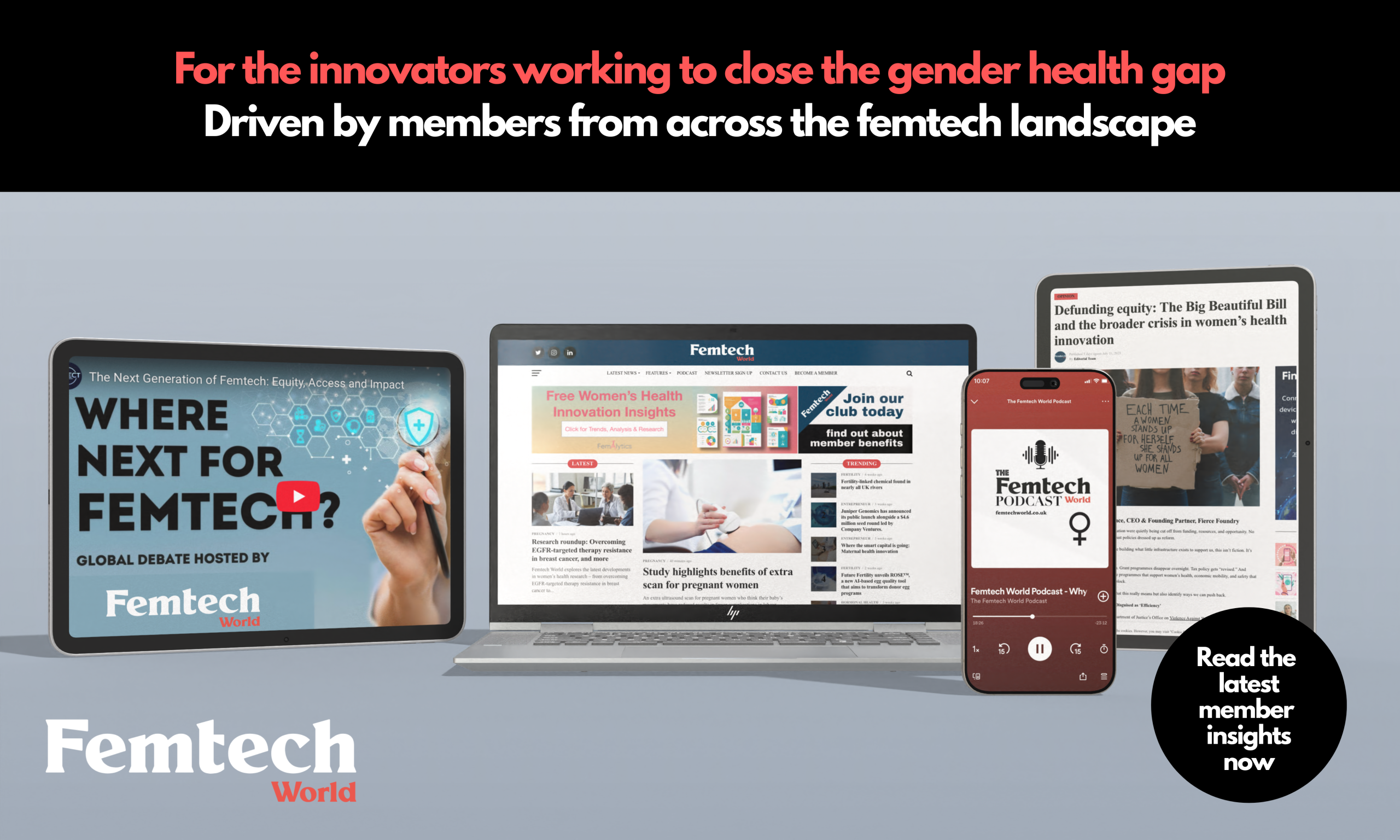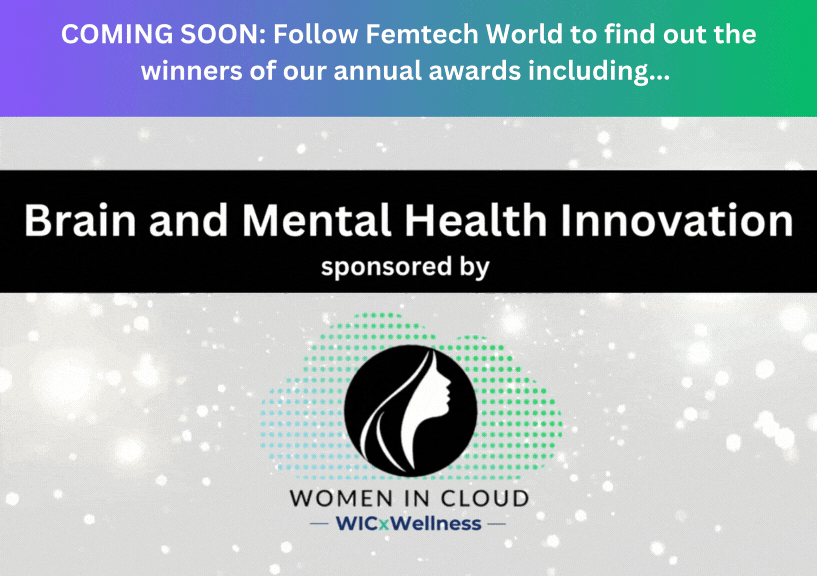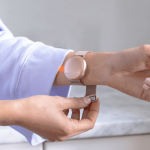News
Roundup: first-of-its-kind partnership with NHS and period tracking app

Femtech World explores the latest business developments in the world of women’s health.
NHS platform Evaro partners with period tracking app Clue in UK-first integration
Evaro, the NHS-licensed embedded healthcare platform, has announced a first-of-its-kind partnership with the period tracking app Clue.
The partnership will provide seamless access to NHS-funded contraception directly through Clue’s app.
This marks the first time a major cycle-tracking platform has integrated prescription healthcare services in the UK, creating a critical solution as the country grapples with an emergency contraception crisis.
2023 data shows the UK had the highest global search volume for emergency contraception and nearly half of UK women face contraception access barriers, with one in 20 patients having to wait at least four weeks to see a GP.
The partnership launches as women’s health takes center stage in the government’s NHS modernisation agenda, with digital medicine transformation identified as a key priority.
The integration brings together Clue’s UK user base with Evaro’s healthcare delivery platform.
Users can transition directly from tracking their cycle in Clue to ordering contraception through Evaro’s embedded pharmacy infrastructure – accessing free NHS-funded contraception with free delivery nationwide.
The service demonstrates how asynchronous healthcare – where consultations happen online at the patient’s convenience rather than requiring real-time appointments – can solve the UK’s healthcare accessibility challenge.
The partnership pioneers embedded healthcare – where consumer brands become healthcare access points by integrating Evaro’s full-stack solution with a single line of code.
The service is available immediately to Clue users in the UK.
US$5m to transform and scale menopause education and training worldwide
A US$5m grant from the Steven & Alexandra Cohen Foundation, led by philanthropist and New York Mets Owner Alex Cohen, will support the digital-innovation phase of the Menopause Society’s NextGen Now initiative.
The grant will create a comprehensive digital ecosystem to leverage cutting-edge digital technologies, ensuring seamless access and consistent updates of educational content.
The initiative supports comprehensive training programmes for current and next generation healthcare professionals to improve the care of midlife women.
Through the NextGen Now initiative, The Menopause Society has said it is committed to reaching 25,000 healthcare professionals within the next three years and ultimately improving the lives of millions of women navigating the complexities of menopause.
The donation will further support The Menopause Society’s vision for a digital strategy for NextGen Now, through an integrated digital-learning platform, advanced virtual- and augmented-reality modules, and a dynamic mobile app.
NextGen Now is a multiphase initiative spanning several years and many projects and programmes.
To continue its success, additional support is still needed. This includes funding for research and data collection.
Progyny expands to include pregnancy, postpartum, and menopause
Women’s health company Progyny has launched its pregnancy, postpartum, and menopause programmes for global employers, available starting January 1, 2026.
The company says that the offerings complement the availability of the company’s existing and marketing-leading global fertility and family building offering, providing multi-national employers with a continuum of integrated services.
The platform is purpose-built for global markets, supporting members in their country-specific environment, helping them with expert support through stages of pregnancy, postpartum, menopause, and midlife to optimise health, productivity, and retention.
Employees uniquely have access to personalised consultations and guided programmes with Global Care Advocates, with maternal health, menopause, and mental health expertise; a curated knowledge centre for evidence-based education on symptoms and more; a country-specific navigator support for local care, regulations, policies, and protections; and, a GDPR-compliant platform.
FDA approves first medical device for women with Asherman Syndrome
Uterine health company Womed has announced that the Food and Drug Administration approved the PreMarket Approval (PMA) application of the Womed Leaf for adult women undergoing hysteroscopic surgery for symptomatic moderate to severe intrauterine adhesions, also referred to as Asherman syndrome.
Womed Leaf is the first medical device to be approved for sale in the United States for that indication.
“This is the first FDA approved barrier for these patients and marks a significant improvement for their ultimate desired outcome.”
Intrauterine Adhesions (IUAs), which refer to the pathological binding of the uterine walls, are caused by scarring of the uterus after procedures such as dilation and curettage or fibroid removal, and can occur in 20 per cent to 45 per cent of those procedures.
IUAs are a major cause of infertility, recurrent miscarriages and pain. IUA treatment is plagued with a very high recurrence rate, leaving women unsure and very anxious about their chance to conceive.
Womed Leaf is intended to reduce the reoccurrence and severity of post-surgical adhesion formation inside the uterus. It consists of a soft thin film made from Womed’s innovative polymer, which is inserted like an IUD at the end of an adhesiolysis procedure.
It expands within the cavity, preventing contact between the uterine walls, and is then naturally and painlessly discharged.
The pivotal PREG2 randomised clinical study that enrolled 160 patients with severe or moderate IUA demonstrated that Womed Leaf significantly reduced the severity of intrauterine adhesion after hysteroscopic adhesiolysis compared with no prevention method and that Womed Leaf has an acceptable safety profile.
Prototype production begins on AI-enabled device for Vulvo-Vaginal Candidiasis
Femtech medical device company Zero Candida Technologies has commenced prototype production of ZC-001.
ZC-001 the first AI-enabled therapeutic device integrating blue light therapy, targeted drug delivery, and wireless diagnostics for the personalised treatment of Vulvo-Vaginal Candidiasis (VVC).
The company has initiated production of 50 prototype units, with completion expected by Q1 2026.
The ZC-001 device is designed to offer meaningful advantages for both physicians and patients by providing personalised, at-home treatment with real-time data transmission, reducing the need for frequent doctor visits while enabling individualised care protocols.
“Every design decision was made with patient comfort and usability in mind,” said Dr Asher Holzer, CTO of Zero Candida.
“It’s the foundation for our next phase of validation and defines the technical standards for how ZC-001 will be built and tested.”
Hormonal health
Thriving through the ups and downs: A guide to women’s mental health

By Naomi Magnus, psychotherapist and founder at North London Therapy
Women’s health is closely linked to our biology, hormones, and the way our brains are wired, all of which shape our life experiences.
From the teen years right through to adulthood, hormonal ups and downs can affect mood, thinking, and emotional resilience in ways that are uniquely female.
Oestrogen and progesterone, for instance, don’t just influence fertility – they also play a key role in regulating neurotransmitters like serotonin and dopamine, which affect mood and anxiety.
In your twenties, when careers, relationships, and life choices are all coming together, it’s perfectly normal to feel anxious or low at times.
Anxiety disorders can often be connected to women’s hormonal and neurological differences. Recognising this can be really reassuring – anxiety can simply be a reflection of a complex, finely tuned system.
A woman’s menstrual cycle can have a big impact on energy, focus, and mood throughout their life, yet many women aren’t taught to track or anticipate these changes.
Later on, life events like pregnancy, postpartum shifts, and perimenopause bring even bigger hormonal swings, which can trigger mood changes, brain fog, or longer-term mental health challenges.
Schools have a crucial role to play in helping young women understand their bodies and mental health.
While the current UK national curriculum covers basic reproductive biology and puberty, it often misses the full picture of hormonal cycles, mental health, and the connection between the two.
Comprehensive education should include tracking menstrual cycles, recognising mood and energy patterns, understanding stress and anxiety triggers, and helping young girls to develop healthy coping strategies.
Teaching these skills early on equips girls with self-awareness, confidence, and the tools to manage their physical and emotional wellbeing throughout life.
Menopause is another life stage that brings significant hormonal changes, which can affect mental health.
As oestrogen and progesterone decline, many women notice mood swings, anxiety, low energy, and brain fog.

Naomi Magnus
Lifestyle adjustments can help – regular exercise, a balanced diet rich in omega-3s and whole foods, good sleep hygiene, and mindfulness or meditation practices can all support mood and cognitive function.
Therapy, such as cognitive behavioural therapy (CBT) or counselling, is effective for managing anxiety or low mood.
For some, hormone replacement therapy (HRT) may be recommended by a GP or specialist to stabilise hormones and alleviate both physical and psychological symptoms.
Women – at any age – can help themselves to feel better when hormone changes strike.
I am an advocate for mindfulness, good sleep, gentle exercise, socialising, and tracking your cycle alongside your mood.
Technology is stepping up – there are some amazing apps that make it easier to understand how your mental health and hormones interact.
It’s also worth acknowledging that times are tough globally – economic uncertainty, climate anxiety, and social pressures can all take their toll on our mental health.
While we can’t control everything around us, getting to know our own bodies and how we respond to stress can make a real difference.
By tuning into our cycles, moods, and energy levels, we can better anticipate challenging days and create a sense of calm amidst the chaos.
Understanding that women’s brains and mental health respond differently across life stages is really important.
Women should approach mental health proactively – because thriving isn’t just about surviving, it’s about knowing your mind and body inside out.
News
Ending the guesswork in cancer care: A CEO’s vision for predictive precision oncology

By Wolfgang Hackl M.D., Founder & CEO, OncoGenomX Inc., Switzerland
During my career as an oncologist and cancer drug developer, one question haunted me more than any other: Why do some patients respond to therapy — while others, with the same diagnosis, do not?
We have innovative treatments, biomarkers, advanced lab tests, and guidelines. But far too often, despite all that science, our treatment decisions come down to educated guesswork.
As medicine evolves, so do our data — but not always our ability to act on it with precision.
That enduring gap between what we know and what we can predict inspired me to found OncoGenomX, and to build PredictionStar™, a platform designed to redefine what precision oncology truly means.
From Biomarkers to Behavior: The Missing Link
Today, most molecular cancer tests focus on eligibility: they tell us whether a tumour expresses a particular target or carries a known mutation. This is useful, but it’s only half the story.

Eligibility does not equal efficacy.
Knowing that a patient’s tumour expresses the estrogen receptor (ER), or harbours a PIK3CA mutation, doesn’t mean it will respond to hormone therapy or PI3K inhibition. It simply means those drugs might work. And in oncology, “might” is not enough.
PredictionStar™ was built to close this precision gap — by answering not just which drugs can be used, but which will actually work.
We call this Precision Drug–Tumor Matching: the ability to segregate effective from ineffective treatments by connecting genomic and phenotypic insights into a coherent tumour profile predictive of therapeutic response.
Introducing PredictionStar™: Coherent Biomarker Intelligence
PredictionStar™ is a multidimensional tumour profiling and decision-support system powered by what we term Generative Clinical Intelligence™ — the synthesis of high-quality sequencing data and AI-driven interpretation into clear, actionable clinical guidance.
 Traditional assays analyse biomarkers in isolation, treating each gene mutation or expression pattern as a separate clue.
Traditional assays analyse biomarkers in isolation, treating each gene mutation or expression pattern as a separate clue.
PredictionStar™ instead identifies logically connected biomarker constellations — genomic enablers that reveal which response mechanisms are active, and phenotypic differentiators how likely the tumour will respond.
This networked approach replaces fragmented snapshots with an integrated, functional map of tumour behaviour.
It provides oncologists with something they rarely get from today’s tests: confidence. In clinical modelling, PredictionStar™ has the potential to reduce overtreatment fivefold and lower the cost of achieving one year of tumour growth control by 35 per cent.
But the numbers tell only part of the story. Behind them are patients spared from unnecessary toxicity — and doctors empowered to treat with precision instead of probability.
Built on the Technology of Giants
PredictionStar™ was designed for seamless integration into modern real-world workflows, harmonized and cross-validated to ensure reliability, and reproducibility.

The platform’s pre-sequencing tumor workup is fully standardised, minimizing inter-laboratory variability that can otherwise reach 70 per cent.
From tumour processing to data interpretation, PredictionStar™ enforces the same rigorous quality in every step, producing consistent and concordant results across labs.
As far as cloud architecture optimized for medical data privacy and global scalability we are privileged to work with world class-players of the health IOT industry
(F. Gaede, Oct 2025, Nordcloud).
A Femtech Focus: Personalising Breast Cancer Therapy
While PredictionStar™ has broad oncology applications, our first focus is hormone receptor-positive breast cancer, the most prevalent form among women.
It is here that the limits of current diagnostics are most evident — and the need for predictive and prescriptive clarity is greatest.
 Even within hormone-dependent breast cancer, the most favorable form of the disease, patient outcomes vary widely. Some women respond beautifully to endocrine therapy for years, while others progress rapidly.
Even within hormone-dependent breast cancer, the most favorable form of the disease, patient outcomes vary widely. Some women respond beautifully to endocrine therapy for years, while others progress rapidly.
What makes the difference? The answers are buried in the tumour’s individual response profiles — but until now, we lacked the tools to decode them. PredictionStar™ offers that decoding ability.
Our non-interventional validation study, conducted in collaboration with clinical researchers from the Veterans Affairs Medical Centers in Cincinnati, Los Angeles, and Miami, involves data from over 4,300 patients with hormone receptor-positive disease.
By correlating predicted responses with actual treatment outcomes, we aim to establish a new clinical standard for predictive accuracy.
Our roadmap includes RUO and LDT certification in 2026, FDA-IDE clearance in Q2 2027, first RUO test sales as early as Q1 2027, and clinical study use from Q3 2027 onwards.
Redefining Precision Oncology
To understand why this matters, we need to reframe what “precision” means.
Most tests today are prognostic or eligibility-based. They classify risk or confirm target presence. PredictionStar™ adds a third, transformative dimension: functional prediction. It asks, “Which therapies will this specific tumour respond to — and how strongly?”
This evolution turns diagnostics into a true decision-support tool, enabling oncologists to design treatment compositions optimized for efficacy, rather than constrained by averages.
The distinction may seem subtle, but its impact for individuals living with breast cancer is enormous: Prognostic and eligibility tests describe. PredictionStar™ guides.
Innovation Through Unity
Our strength lies in collaboration.
I’ve often said that OncoGenomX stands “on the technology of giants, powered by the ambition to transform.” That is more than a slogan — it’s our reality. We built PredictionStar™ not as an isolated product, but as a platform for partnership.
Its architecture invites integration — with hospital systems, sequencing providers, AI developers, and pharmaceutical R&D pipelines.
In the coming years, we envision PredictionStar™ evolving into a broader family of tools: PredictionStar DX™ for predictive diagnostics, PredictionStar GCI™ for data integration and generation of actionable clinical intelligence, and PredictionStar IOT™ for real-time connectivity. Each module serves the same purpose: to transform complexity into clarity.
From Data to Decisions: A Personal Reflection
At its heart, PredictionStar™ was born from empathy.
As a clinician, I saw too many patients fall through the cracks — not because we lacked treatments, but because we lacked foresight.
Data without interpretation is noise. Our mission is to turn that noise into understanding.
When I speak with oncologists today, I sense both excitement and relief: “We will no longer be limited to maybes.” “We can begin to quantify response likelihood, combine therapies more rationally, and give patients something we cannot give today: certainty”.
Technology can be transformative, but only when anchored in purpose. For OncoGenomX, that purpose is simple — to give every patient the best possible chance at lasting response.
The Road Ahead
Our journey is just beginning. We are validating, scaling, and expanding across cancer types — from breast to prostate, lung, and beyond.
But our guiding principle remains unchanged: wherever there is cancer, there is a need for precision drug–tumour matching.
The convergence of genomics, phenomics, AI, and clinical data is redefining healthcare.
PredictionStar™ is part of that transformation — proving that predictive precision is not a futuristic concept, but an attainable standard.
We owe it to patients, to clinicians, and to science itself to make that standard universal.
In Closing
When I founded OncoGenomX, I imagined a world where no cancer patient has to live with uncertainty — where treatment is guided by prediction, not probability.
Today, that world feels within reach. PredictionStar™ is more than technology. It’s a promise:
That every patient deserves clarity. That every tumour can be understood.
And that, together, we can end the guesswork in cancer care.
Contact: Dr. Wolfgang Hackl | Founder & CEO, OncoGenomX | E-Mail | LinkedIn WH | Company Webpage | LinkedIn OGX
Wellness
Occupational therapy eases emotional strain of high-risk pregnancies, study finds

Occupational therapy can ease anxiety and emotional strain for women experiencing high-risk pregnancies, with cognitive-based techniques found to be most effective, new research has revealed.
Joint research from Edith Cowan University and the University of St Augustine for Health Sciences reviewed a range of psychosocial occupational therapy approaches and found that cognitive-based interventions had the strongest impact on managing perinatal anxiety, depression and stress.
The review examined several therapy types, including cognitive-based, counselling-based, sensory-based, emotion-based and integrated approaches.
Dr Thuy Tran is occupational therapy lecturer at Edith Cowan University’s School of Medical and Health Sciences.
The researcher said: “There is a lot of research evidence that reveals high-risk pregnancies result in increased levels of anxiety, stress, depression and a reduced quality of life.
“And while research has been done on how psychosocial occupational therapy could assist in those areas, there was no evidence which method was most effective.”
Around one in five women experience high-risk pregnancies requiring specialised monitoring and care.
Such pregnancies — which may involve conditions like pre-eclampsia, gestational diabetes or multiple births — often cause significant emotional distress, including fear, anxiety and uncertainty.
Occupational therapy helps people manage daily activities and life transitions through targeted interventions.
Psychosocial occupational therapy specifically addresses mental health and emotional wellbeing alongside functional support.
The researchers found that cognitive-based interventions were most effective for managing perinatal anxiety, depression and stress.
Counselling-based interventions had a moderate impact on anxiety, depression and quality of life, but a strong effect on reducing stress.
Sensory-based interventions appeared ineffective for anxiety, with limited evidence of impact on depression, stress or quality of life.
Lead author Dr Sabina Khan from the University of St Augustine for Health Sciences said the findings provide much-needed clarity about which approaches deliver the greatest benefit.
Khan said: “By identifying that cognitive-based and counselling-based interventions are the most effective in reducing anxiety, stress and depression, this research helps guide clinicians toward evidence-based practices that can meaningfully improve women’s wellbeing during a particularly vulnerable time.
“Women facing high-risk pregnancies frequently navigate fragmented systems.
“Embedding occupational therapy early helps close the gap between medical management and real-world function.”
Dr Tran said the research suggests practitioners should include cognitive-behavioural techniques in occupation-based sessions and place greater emphasis on emotional and cognitive assessment during the perinatal period.
The researcher said: “We need to have a holistic approach to working with clients to ensure that our strategies help them to function optimally.
“Whether this is in their new role as a mother, or their role as a mother to multiple children, or as a partner, or in their social role.”
The role of occupational therapists in women’s health is steadily growing in Australia.
Most practitioners work in private practice and are recognised as mental health care providers, making services accessible through mental health care plans, enhanced primary care plans or self-referral.
While some hospitals already employ occupational therapists in this field, there are calls for this to become standard care nationwide.
Dr Tran urged pregnant women, particularly those experiencing high-risk pregnancies, to seek intervention early.
Dr Tran said: “Pregnancy is such an intense phase, with women experiencing significant emotional, psychological and physical changes in their bodies, all while their social and work roles are also transitioning.
“A lot of focus is placed on the baby, but we don’t really talk about the emotional wellbeing of the mother and the transition from one role to the next.
“Having an occupational therapist can provide you with strategies to help that transition.”

 News1 week ago
News1 week agoDozens of women report suffering painful burns after using Always sanitary towels
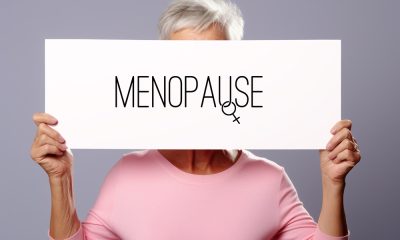
 News4 weeks ago
News4 weeks agoFDA plans to revise black box warning on menopause hormone therapies
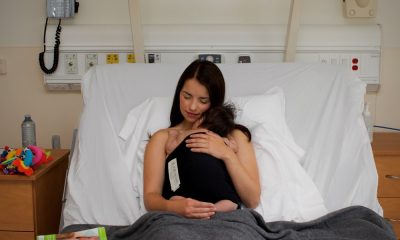
 Insight2 weeks ago
Insight2 weeks agoWomen’s health innovations recognised in TIME’s Best Inventions 2025

 Entrepreneur3 weeks ago
Entrepreneur3 weeks agoAI-powered women’s health companion Nexus launches in UK
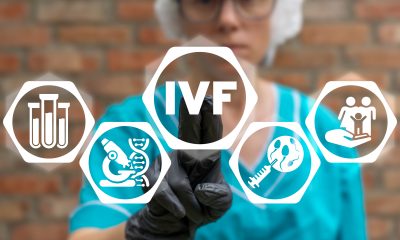
 News3 weeks ago
News3 weeks agoScientists turn human skin cells into eggs in IVF breakthrough

 News1 week ago
News1 week agoCutting through the noise in femtech – key takeaways from Women’s Health Week 2025
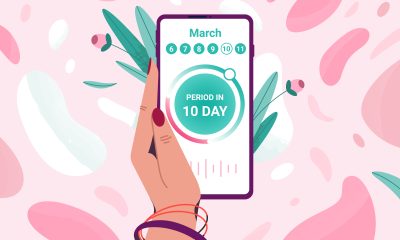
 News3 weeks ago
News3 weeks agoMenstrual cycle affects women’s reaction time, study finds

 Menopause4 weeks ago
Menopause4 weeks agoDaily pill could delay menopause ‘by years,’ study finds




